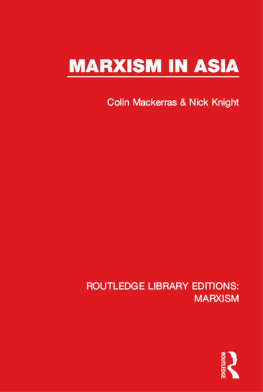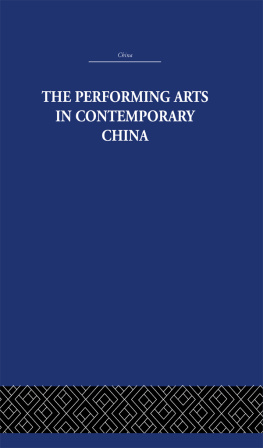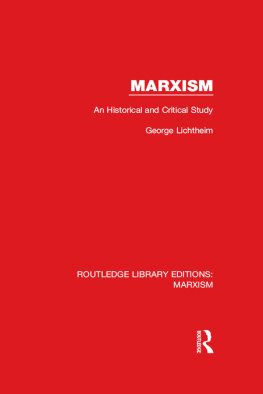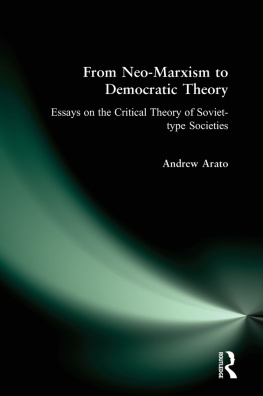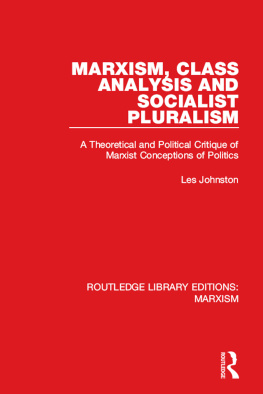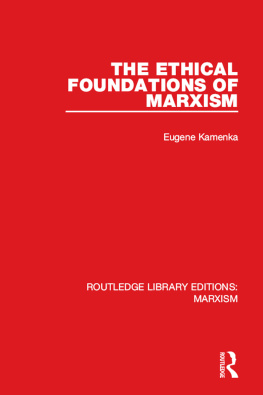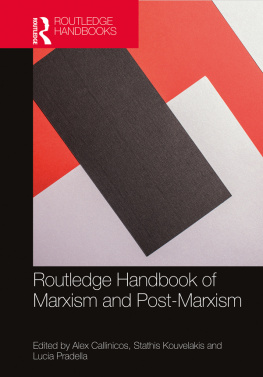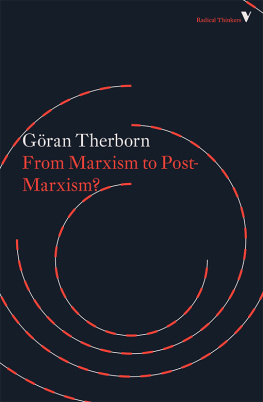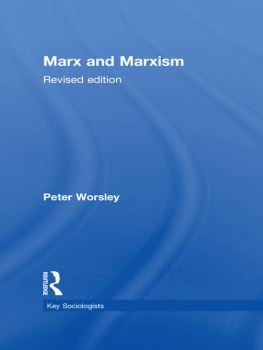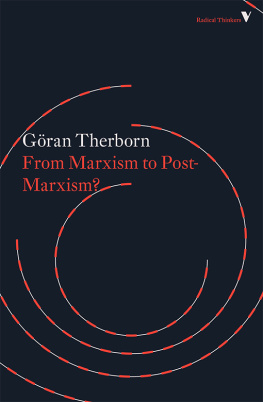ROUTLEDGE LIBRARY EDITIONS: MARXISM
Volume 16
MARXISM IN ASIA
MARXISM IN ASIA
COLIN MACKERRAS & NICK KNIGHT
First published in 1985
This edition first published in 2015
by Routledge
2 Park Square, Milton Park, Abingdon, Oxon OX14 4RN
and by Routledge
711 Third Avenue, New York, NY 10017
Routledge is an imprint of the Taylor & Francis Group, an informa business
1985 Colin Mackerras and Nick Knight
All rights reserved. No part of this book may be reprinted or reproduced or utilised in any form or by any electronic, mechanical, or other means, now known or hereafter invented, including photocopying and recording, or in any information storage or retrieval system, without permission in writing from the publishers.
Trademark notice: Product or corporate names may be trademarks or registered trademarks, and are used only for identification and explanation without intent to infringe.
British Library Cataloguing in Publication Data
A catalogue record for this book is available from the British Library
ISBN: 978-1-138-85502-1 (Set)
ISBN: 978-1-315-71284-0 (Set) (ebk)
ISBN: 978-1-138-88680-3 (Volume 16) (hbk)
ISBN: 978-1-315-71457-8 (Volume 16) (ebk)
Publishers Note
The publisher has gone to great lengths to ensure the quality of this reprint but points out that some imperfections in the original copies may be apparent.
Disclaimer
The publisher has made every effort to trace copyright holders and would welcome correspondence from those they have been unable to trace.
MARXISM
IN
ASIA
COLIN MACKERRAS & NICK KNIGHT
1985 Colin Mackerras and Nick Knight
Croom Helm Ltd, Provident House, Burrell Row,
Beckenham, Kent BR3 1AT
Croom Helm Australia Pty Ltd, Suite 4, 6th Floor,
64-76 Kippax Street, Surry Hills, NSW 2010, Australia
British Library Cataloguing in Publication Data
Marxism in Asia.
1. Communism Asia
I. Mackerras, Colin II. Knight, Nick
335.4095 HX376.A6
ISBN 0-7099-1745-7
Printed and bound in Great Britain
by Billing & Sons Limited, Worcester.
CONTENTS
Nick Knight and Colin Mackerras
Nick Knight
Nick Knight
Nick Knight
Colin Mackerras
Colin Mackerras
Alan Rix
Sean Kelly and Colin Mackerras
Ben Kiernan
Robert Cribb
Nick Knight and Colin Mackerras
The decision to write and edit this book grew out of our experiences teaching an advanced undergraduate course entitled Marxism in Asia in the School of Modern Asian Studies at Griffith University. It became clear to us that, while an enormous quantity of secondary literature on the various Asian Marxisms is available, no satisfactory or readily accessible text existed which could provide reasonably simple interpretations within a comparative framework. This volume is intended to fill that gap.
Marxism in Asia is thus designed primarily as an introductory reference work, suitable for senior undergraduates who have some understanding of European Marxism and who are interested in the way in which Marxist ideas have been interpreted in different Asian contexts. We hope, nevertheless, that the judgements and interpretations that appear in this book will also be of some interest to the specialist. We believe that an objectivist account of the various Asian Marxisms is not possible; we are dealing here with the nebulous world of ideas, and the interpretations we have rendered are unlikely to coincide in all essential details with previous interpretations. The study and analysis of ideas proceeds through constructive argumentation and debate, not through the continued reiteration of time-honoured commentaries. We would not, therefore, deem it as negative if our readings of Asian Marxisms were challenged by the specialist in a spirit of positive intellectual inquiry. Similarly, we invite the students for whom this work is primarily intended to read it critically, extending their capacity to respond in a critical vein by studying the more detailed interpretations referred to in the select bibliographies appended to each chapter.
The focus of this volume is the Marxisms of East and Southeast Asia. However, we were forced, even within this restricted sphere, to exclude certain Asian Marxisms. There is, for example, no reference to the theoretical doctrines of the New Peoples Army of the Philippines, of the Malay or Thai Communist Parties, or of the Pathet Lao of Laos. Their exclusion was dictated by the requirements of brevity rather than a failure to appreciate the important role that such Marxist-derived ideas have played in their respective social contexts. Consequently, it was our duty as editors to select for consideration those Marxisms which appeared to us to have exercised the greatest influence both domestically and within the international communist movement.
We hope that this selection of essays will prove a useful introduction to the study of Marxism in Asia, and contribute to a clearer understanding of the process of differentiation which Marxism has undergone to accommodate itself to the particular characteristics and needs of different Asian societies.
Many people have contributed their time and energy to the production of this book. Kerrie Gibbon did a splendid job typing and coding the original manuscript. Jeff Russell and Geoff Dow provided much-needed criticism of . Barry Mather and Richard Blundell provided technical advice on the problems associated with producing a photo-typeset camera-ready manuscript. And Jeff Russell laboured mightily to transform a mass of inchoate scribblings into a finished camera-ready copy suitable for publication; he also produced the index. To these people, and others who have encouraged us in this project, we offer our sincere gratitude.
Nick Knight
Colin Mackerras.
Nick Knight and Colin Mackerras
In the century since Marxs death, there has been a profusion of interpretations by Marxs critics, adherents and scholars as to what constitute the essential elements or themes of Marxism. This continuing process of differentiation within the Marxist tradition has involved theoretical disagreements over key concepts of Marxism and how Marxism should best be employed in the analysis of social and historical development. It has also involved disagreements which have sprung from the national differences among the various societies in which Marxism has become an ideological force of political importance.
The differentiation of a doctrine or ideology in this manner is of course not without precedent. The 2000-year history of Christianity is a good example of a doctrine which has experienced schism and fragmentation to produce a multiplicity of creeds and organisations all claiming allegiance to a common source of inspiration. While Marxism is a much younger doctrine than Christianity, its history suggests an even more volatile predisposition to manifest very varied formulations concerning true or appropriate interpretations.
The differentiation of Marxism along national lines and the hostility which has resulted between rival national interpretations of its political implications is one of the great ironies of history. One of the dominant themes of Marxs thought has usually been considered to be internationalism, a hope that common class interests could unite individuals across national boundaries and that the parochialism of the nation would be transcended by the strength of common identification of members of the same class. Class identification was, from this perspective, a more powerful force than national identification.

